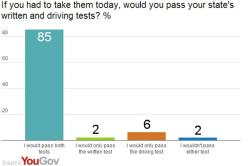Should older drivers be required to take road tests?
The question of whether older drivers should be required to take road tests is a topic of debate and consideration for policymakers, traffic safety experts, and advocates for older adults. The decision to implement road tests for older drivers often involves balancing concerns related to safety, individual rights, and potential age-related changes in driving abilities. Here are some factors to consider:
**1. Safety Concerns:
- Safety is a primary concern when evaluating the driving abilities of older adults. As people age, there may be changes in vision, reaction time, and cognitive abilities that can affect driving safety. Implementing road tests can help identify individuals who may have developed limitations that impact their ability to drive safely.
**2. Individual Variation:
- It's important to recognize that age alone is not a reliable predictor of driving abilities. There is significant individual variation among older adults, and many continue to drive safely well into their later years. Assessments based on an individual's health, cognitive functioning, and driving history may be more effective than age-based criteria.
**3. Regular Assessments:
- Rather than singling out older drivers, some advocate for regular assessments for all drivers, regardless of age. This approach could involve periodic evaluations of driving skills and cognitive abilities for everyone, ensuring that all drivers are regularly checked for changes that may affect their ability to drive safely.
**4. Alternative Transportation Options:
- As individuals age, they may encounter health challenges or mobility issues that make driving difficult. Providing and promoting alternative transportation options, such as public transit, rideshare services, or community transportation programs, can help meet the mobility needs of older adults without relying solely on individual driving.
**5. Education and Resources:
- Providing education and resources for older drivers can help them stay informed about changes in driving laws, technologies that enhance safety, and strategies to maintain safe driving habits. Educational programs may empower older drivers to make informed decisions about their continued ability to drive.
**6. Personalized Assessments:
- Consideration should be given to implementing personalized assessments that take into account an individual's health, cognitive function, and driving history. This approach can be more effective than age-based assessments and respects individual rights.
**7. Legislation and Policy:
- The decision to require road tests for older drivers is typically a matter of legislation and policy. Policymakers need to carefully consider the potential impact on individual freedoms, the practicality of implementation, and the overall goal of improving road safety.
Ultimately, any measures taken should be based on a balance between safety concerns and the recognition of individual rights. Regular assessments and evaluations, regardless of age, can contribute to road safety and address concerns related to changes in driving abilities over time.
Should there be mandatory road tests for older drivers?
The issue of mandatory road tests for older drivers is a complex one with no easy answer. There are strong arguments on both sides of the debate, and finding a solution that balances safety concerns with individual autonomy and fairness is challenging.
Arguments in favor of mandatory road tests:
- Safety: Older drivers, even those with good health, may experience declines in vision, hearing, reaction time, and cognitive function, making them more susceptible to accidents. Mandatory road tests could identify drivers who are no longer safe behind the wheel and help prevent accidents.
- Public health: Traffic accidents involving older drivers can have devastating consequences not only for themselves but also for other road users. Implementing road tests could potentially save lives and reduce healthcare costs related to accidents.
- Fairness: Requiring road tests for all drivers, regardless of age, could be perceived as a fairer approach compared to targeting only older drivers. This avoids discrimination based on age and ensures everyone meets the same minimum standards for driving.
Arguments against mandatory road tests:
- Individual autonomy: Mandatory road tests can be seen as an infringement on the freedom and independence of older adults, especially those who rely on driving for transportation and daily activities. Taking away their driving privileges could significantly impact their quality of life.
- Effectiveness: The effectiveness of mandatory road tests in reducing accidents is not definitively proven. Some studies have shown little to no effect, while others suggest potential benefits. More research is needed to determine their true impact.
- Cost and logistics: Implementing and administering mandatory road tests can be expensive and logistically challenging. It's important to consider the cost-effectiveness and feasibility of such a program.
Alternative approaches:
- Graduated driver licensing: This program, already implemented in many states for young drivers, could be adapted for older drivers. It could involve increased requirements for vision and cognitive tests, refresher driving courses, or restrictions on driving times and locations.
- Improved driver education and training: Providing resources and programs that help older drivers stay safe and confident on the road could be a more effective and less intrusive approach than mandatory testing.
- Technological advancements: Implementing in-vehicle technology that assists with driving, such as lane departure warnings and automatic braking systems, could offer additional safety measures for all drivers, including older adults.
Ultimately, the decision of whether or not to implement mandatory road tests for older drivers is a complex one that requires careful consideration of all the arguments and potential consequences. Open discussions and research are crucial to finding a solution that prioritizes safety while respecting individual autonomy and ensuring fair treatment for all drivers.
I hope this information provides a balanced overview of the issue and helps you form your own opinion on this important topic.







